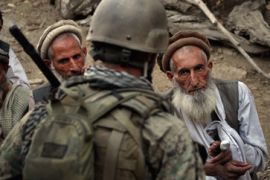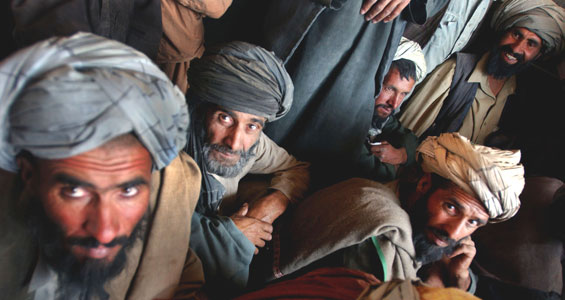Is the West losing the Pashtuns?
As Afghan civilian casualties increase dissent grows against Nato.

 |
| The Pashtuns say the West disregards civilian casualties [GALLO/GETTY] |
In the middle of the night on December 17, Amir Hassan, his wife, and their 14-year-old nephew were killed during a Coalition Forces operation in the eastern Afghan province of Khost.
Qudratullah, Hassan’s 10-year-old son, survived but was bitten by an attack dog shortly after the US-led raid.
The US military claimed that its forces had targeted “known individuals with al-Qaeda links” and had even been shot at.
Hassan’s brother and neighbours said the raid had resulted in the deaths of three civilians with no ties to insurgents or armed groups.
Though Kabul called on US forces to launch an investigation into the attack, increasing civilian deaths from military operations have been stoking deep anger and resentment among Afghans – and in particular the Pashtuns of eastern and southern Afghanistan, where much of the fighting has occurred.
If the same pattern of behaviour continues and there is this utter lack of respect by the Coalition Forces for the Pashtuns, the West will ultimately lose in Afghanistan.
A better tomorrow?
After 9/11, Afghans welcomed the international community with open arms. Many were optimistic and hoped for a better tomorrow.
Yet seven years later, the promised ‘Marshal Plan’ has not yet been delivered and the relationship with the West is now at a turning point as innocent Afghans are killed by indiscriminate US-led air raids.
A recent report by the Afghan Independent Human Rights Commission revealed that in the first 10 months of 2008, Coalition Forces were responsible for 700 of the total 1,798 civilians killed.
Tribal elders have also accused Coalition Forces of disrespecting local culture and centuries-old customs.
Ignoring realities
They say aggressive night searches of civilian houses are angering the Pashtun population. However, a majority of Pashtuns are still tolerant and have not completely given up on the current political process.
The sad fact is that the West has yet to comprehend two important realities: First, the Pashtuns are the foremost victims of terrorism and extremism and that they have extended their hand of friendship to the West to defeat this common enemy.
For the last three decades, the Pashtun population has suffered immensely.
They have lost generations to illiteracy and hundreds of thousands of young men served as foot soldiers in the battle against the former Soviet Union.
Billions of dollars were spent by the West through regional intelligence agencies on establishing madrassas to radicalise young Pashtuns in an effort to counter the growth of Marxism.
The Taliban also exploited the Pashtuns to their advantage: whenever they were winning, they were Muslim but when they were losing on the frontlines, they harnessed the traditional principles of Pashtunwali to mobilise the Pashtun population and to earn their support.
Poignantly today, nearly 50 per cent of the schools in the Pashtun areas in the south have been closed down creating yet another illiterate generation ready to serve as cannon fodder.
Conservative, collective society
Second, the Pashtuns are deeply conservative and live in a collective society.
Whenever one is killed, the good will of his family, his tribe and his larger community is lost.
Clearly, the insurgents have fully capitalised on this and are gaining the support of vengeful segments of the Pashtun population.
Random attacks which lead to the deaths of innocents are used by the insurgents as ‘political oxygen’ for their recruitment purposes.
A study by the Centre for Conflict and Peace Studies assessed that revenge against Coalition Forces has become a key motivation for joining the insurgency.
There is a growing perception among the Pashtuns that the West is here to avenge the attack on the Twin Towers and their targets are only the Pashtuns.
In addition, there is a belief that the West in only interested in Afghanistan for its long-term strategic influence in the region at the expense of the Afghan people.
Losing patience
Evidently, in the aftermath of 9/11, the objectives were the same: to defeat the Taliban and al-Qaeda and to deliver on the Afghan hope.
Unfortunately the opposite is happening with the Coalition guns turning against innocent Afghans.
In a recent gathering of elders, one tribal chief said “we are not terrorists but victims, and the West needs to realise this before we lose our patience”.
The Pashtuns want protection, education and better delivery of services from both the Afghan government and the Coalition Forces.
Yet their challenges are viewed only through the narrow lens of the global war on terrorism.
Even on terrorism, most would argue that the centre of gravity of terrorism has been across the Durrand line in Pakistan and particularly in the various sanctuaries.
In Afghanistan, and especially in the Pashtun areas, the populace are enduring the symptoms of terrorism; since there is no comprehensive strategy for Pakistan, innocent Pashtuns are paying the price with their lives.
It is not too late, however.
Afghanistan may be spiralling down but significant numbers of Pashtuns still know that the West is needed. If Afghanistan is to succeed as a state, efforts must be re-focused and the killing of civilians halted.
Throughout history, strategies for Afghanistan formulated either in Moscow or London, failed because they misunderstood the Pashtun factor.
Today, Washington must not repeat that historic mistake and keep in mind that if they Pashtuns lose their patience, the West’s efforts in Afghanistan will certainly fail.
Hekmant Karzai is the founder and director of the Centre for Conflict and Peace Studies in Kabul, Afghanistan.
The views expressed by the author are not necessarily those of Al Jazeera.